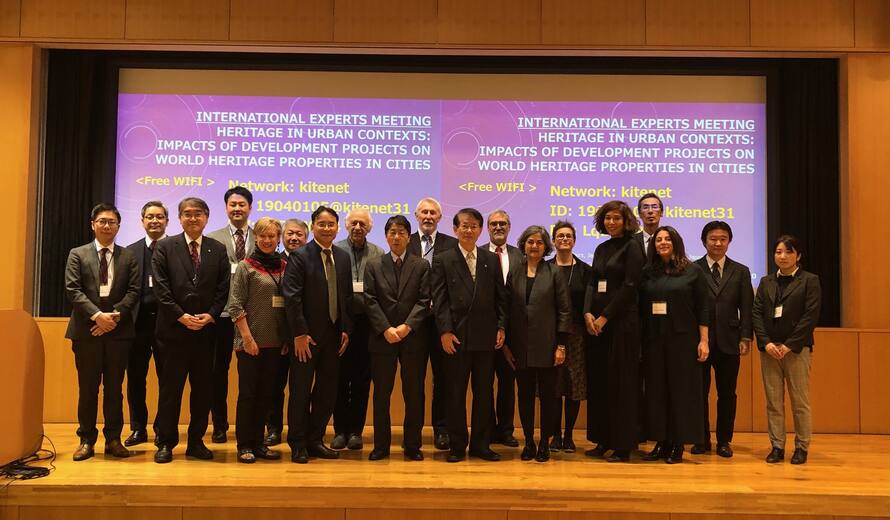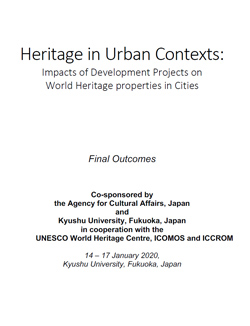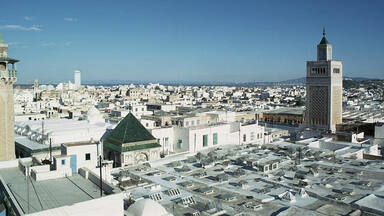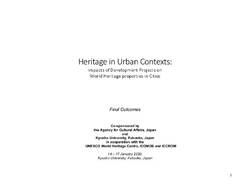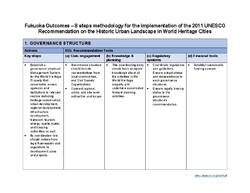International Experts Meeting - Heritage in Urban Contexts: Impacts of Development Projects on World Heritage properties in Cities
The international experts meeting "Heritage in Urban Contexts: Impacts of Development Projects on World Heritage properties in Cities" took place between 14 and 17 January 2020 at Kyushu University, Fukuoka, Japan. It was co-sponsored by Japan's Agency for Cultural Affairs and Kyushu University in cooperation with the UNESCO World Heritage Centre, ICOMOS and ICCROM.
In recent sessions of the World Heritage Committee, there have been increasing reports of cases where a worrying pattern of situations affecting heritage sites in urban contexts has emerged. Hence, it is urgently expected and internationally significant to deepen a methodology to identify and evaluate the values of heritage properties in urban contexts. One of the issues flagged during the discussion on the state of conservation of properties during the 43rd session of the World Heritage Committee in Baku was the urgent need for developing of strategies and guidance for better integration of Management Plans for World Heritage sites in the urban development plans and processes (Decision 43 COM 7.3). Previous World Heritage Committee Decisions have also identified the need for better addressing urban development pressures in and around World Heritage properties. In order to respond to this task, the Government of Japan offered to host an experts meeting to discuss and establish a methodology to support this initiative and the World Heritage Committee welcomed this offer.
The Experts Meeting
The text of the UNESCO 2011 Recommendation on the Historic Urban Landscape (HUL Recommendation) identifies four types of new tools to support the implementation of its principles: (a) Civic engagement tools, (b) Knowledge and planning tools, (c) Regulatory systems, and (d) Financial tools. In order to focus on main issues, the Expert Workshop will consider diverse types of tools, such as the definition of heritage attributes in the urban context. These components are critical in enhancing the management of change as an integral part of urban conservation and establishing guidelines for it.
Key questions
Key questions and panels have been structured around questions like:
- When development projects are proposed in and around heritage cities and heritage sites in cities, what kind of information or data concerning the proposed projects are needed to assess their potential impacts on the values (in the case of the World Heritage, the Outstanding Universal Value)?
- What methodologies exist for assessing the value of heritage?
- Who are the key stakeholders or the key beneficiaries who will pay the greatest cost?
- What could an integrated approach to conservation and development look like?
By engaging on these components, it will be possible to further develop a specific methodology and promote detailed guidelines.
Objectives
The experts meeting focused on ways to assess the impact on the OUV and heritage values of development projects in and around World Heritage properties in cities.
This is considered in the context of:
- guidance documents for the implementation of the HUL Recommendation (Decision 39 COM 11)
- strategies and guidance for better integration of Management Plans for urban World Heritage properties in the urban development plans and processes (Decision 43 COM 7.3)
- Implementation of UN Sustainable Development Goals, specifically Goal 11, and the New Urban Agenda at the local level.
Approaches
In this context, the attention focused on the application of the Recommendation to address ‘the broader setting’ and on the implementation of the HUL Recommendation (adopted by the 36th session of the UNESCO General Conference in 2011) to address “the need to better integrate and frame urban heritage conservation strategies with the larger goals of overall sustainable development…”. This UNESCO standard-setting instrument responds to concerns and threats of transformation of urban areas and their settings due to rapid and uncontrolled development including large development projects. It proposes new policies, standards, and principles to balance the increasing pressures of cities on people and the planet, and to bring a shift of attitude to the conservation and management of cultural heritage to enable better integration of cultural heritage conservation in national and urban development policies.
Following the results of the Second Consolidated Report (2019) on the implementation of the HUL Recommendation by Member States, as well as looking at the outcome of several debates and discussion of experts since 2011, (for eg. International Expert Meeting in Shanghai, China, 26-28 March 2018), there was a clear need to articulate specific tools for assessment of impacts of new developments on heritage in the urban context.
Sustainable Development Goals, the New Urban Agenda and World Heritage:
Relationships between heritage and urban issues are complex, and touch on social and economic as well as cultural factors as highlighted in target 11.4 of the UN Sustainable Development Goals (SDGs) defined in the 2030 Agenda for Sustainable Development (2030 Agenda). This target defends that the safeguarding of heritage is essential to make our cities “inclusive, safe, resilient and sustainable”. Moreover, the UNESCO Executive Board in its 206th session and later on the 40th General Conference, reaffirmed the importance of the HUL Recommendation and of its implementation by Member States, in particular in the context of the 2030 Agenda, the UNHabitat New Urban Agenda.
Impact Assessment
The existing Heritage Impact Assessment (HIA) process in cases of development proposals in and around Cultural World Heritage sites is currently available as guidance issued by ICOMOS developed in 2008 and updated in 2011. It has become apparent that a broader focus is required for heritage properties in cities where various complex urban factors apply. With the revision of Impact Assessment carried out cooperatively with ICCROM, IUCN, World Heritage Centre, and ICOMOS to revise the assessment guidelines to better assess impacts on urban heritage, a need was identified, as a first step, to develop methods that identify attributes and that establish the value judgments that apply to heritage in urban contexts.
Further Reading
Related websites
Historic Urban Landscape
State of Conservation (SOC) information system
World Heritage Cities Programme
Documents
UNHabitat Action Framework for the Implementation of the New Urban Agenda
UNESCO 2011 Recommendation on the Historic Urban Landscape
ICOMOS Charter for the Conservation of Historic Towns and Urban Areas 1987
ICOMOS International Cultural Tourism Charter – Managing Tourism at Places of Cultural Significance 1999
ICOMOS Xi’an Declaration on the Setting of Heritage Structures, Sites and Areas 2005
ICOMOS The Valetta Principles for the Safeguarding and Management of Historic Cities, Towns and Urban areas 2011
ICOMOS The Paris Declaration on Heritage as a Driver of Development 2011
Guidelines
ICOMOS, 2011, Guidance on Heritage Impact Assessment for World Heritage Properties 2011
IUCN, 2013 World Heritage advice note: environmental assessment
UNESCO, 2019, Operational Guidelines for the Implementation of the World Heritage Convention
Kyushu University, Fukuoka, Japan
Decisions (2)
The World Heritage Committee,
- Having examined Documents WHC/19/43.COM/7, WHC/19/43.COM/7A, WHC/19/43.COM/7A.Add, WHC/19/43.COM/7A.Add.2, WHC/19/43.COM/7A.Add.3, WHC/19/43.COM/7B, WHC/19/43.COM/7B.Add, WHC/19/43.COM/7B.Add.2 and WHC/19/43.COM/7A.Add.3,
- Recalling Decision 42 COM 7, adopted at its 42nd (Manama, 2018),
Management Plans in the context of urban development - Noting that the many Management Plans and management systems for urban properties are not adequately anchored in the legal mechanisms, systems, and processes for urban development,
- Also noting that the pressures of high investment urban development projects in and around properties are increasingly a threat to their Outstanding Universal Value (OUV), and that in contrast, the OUV could provide a valuable opportunity for the property and its wider setting to define a new urban vision that integrates and valorizes the OUV with new needs and aspirations,
- Recalling that the approach of the 2011 UNESCO Recommendation on the Historic Urban Landscape has highlighted the need for urban areas to be well integrated into their wider social, economic and cultural context, calls on all States Parties to prepare and deliver Management Plans, for properties in and around urban areas, so that their planning elements can be integrated directly into the planning and development policies, plans, processes and instruments; regardless of whether the property is inscribed for its urban values or not;
- Requests the World Heritage Centre and the Advisory Bodies to continue reflecting on the mechanisms and tools needed to assess and guide interventions in and around urban properties to sustain the OUV of the properties and to promote sustainable development and actively engage with the wider development processes that could over time impact the appearance, use, and meaning of buildings and spaces in properties and their settings;
- Notes with appreciation the International Union of Architects Forum (UIA) on “Mass Tourism in Historic Cities”, which was held in Baku, Azerbaijan, on 7-9 June 2019 and welcomes the proposal of the UIA to prepare, in close cooperation with the World Heritage Centre and the Advisory Bodies, guidelines for architectural competitions in and around World Heritage urban properties that will recognise their Outstanding Universal Value;
- Welcomes the offer of the Government of Japan to host an international experts meeting in January 2020 to provide further guidelines for the integration of the assessment of the impacts for interventions in the wider processes of urban management by applying the 2011 Recommendation on the Historic Urban Landscape to address the challenges of increased urbanization in close cooperation with the World Heritage Centre and the Advisory Bodies;
- Calls on the UNESCO Secretariat to develop measures to address the inherently limited nature of institutional capacity in SIDS, acting as an impediment in identifying, inventorying and proposing potential cultural and natural heritage sites for listing;
Tourism - Acknowledging the contribution of sustainable tourism to the 2030 Agenda on Sustainable Development and the positive impact it can have on local communities and the protection of World Heritage properties, nevertheless notes with concern that the number of properties negatively affected by overcrowding, congestion and tourism infrastructure development continues to increase;
- Noting that the protection of Outstanding Universal Value (OUV) must be a central objective for all World Heritage properties, requests States Parties to develop visitor management plans and strategies that address the seasonality of tourism (smoothing visitor numbers over time and spreading visitors across sites), encourage longer more in-depth experiences promoting tourism products and services that reflect natural and cultural values, and limit access and activities to improve visitor flows and experiences, while reducing pressures on the attributes which underpin OUV ;
- Encourages the States Parties to support UNESCO in its efforts to assist heritage and tourism managers with system development and data collection to help destinations understand their specific situations and early warning signs, provide incentives for sustainable tourism development and raise awareness to change visitor behaviour;
- Calls on UNESCO Secretariat to recognize opportunities for forging synergies between core UNESCO activities that could be harnessed to strengthen heritage sites: youth, heritage tourism training, sustainable heritage tourism and biodiversity, and relate it directly to SIDS;
Heritage Impact Assessments / Environmental Impact Assessments (HIAs/EIAs) - Notes the progress of revising the guidance on impact assessment for World Heritage undertaken by the ICCROM/IUCN World Heritage Leadership Programme together with the World Heritage Centre and ICOMOS.
The World Heritage Committee,
- Having examined Document WHC-15/39.COM/11, WHC-15/39.COM/10.B, WHC-15/39.COM/13A and WHC-15/39.COM/INF.13A,
- Recalling Decision 37 COM 12.II, adopted at its 37th session (Phnom Penh, 2013),
- Decides to establish a Consultative Body under Rule 20 of the Rules of Procedure during its 39th session;
- Adopts the proposed revisions of the Operational Guidelines, as presented in the marked-up version attached to this Decision[1], namely concerning paragraphs 28, 31, 38, 40, 44, 62, 66, 71, 80, 98, 99, 102, 111, 112, 115, 116, 122, 123, 128, 132, 140, 141, 143, 148, 149, 155, 159, 160, 164, 165, 166, 168, 169, 176, 180, 181, 184, 192, 232, 241, 252, 260, 262, 263, 265, 266, 275, 276, 278, Annex 2B, 5, 6, 13 and 14 as well as the Bibliography;
- Decides to extend the mandate of the ad hoc working group extended by one extra regional group representative who is not a member of the World Heritage Committee, established at the 38th session (Doha, 2014) to be convened by Turkey, to further discuss and make recommendations on Paragraph 61 as well as on the sustainability of the World Heritage Fund;
- Further decides to suggest that the 20th General Assembly of States Parties in November 2015 discuss the recommendations of the ad hoc working group in order for the latter to submit its final recommendations to the 40th session of the World Heritage Committee in 2016 for a decision;
- Requests the World Heritage Centre and the Advisory Bodies, to produce, subject to extra-budgetary funding, a guidance document on urban heritage, including its definition, identification, conservation and management, based on the Historic Urban Landscape approach;
- Also decides that Annex 3 to the Operational Guidelines should be reviewed entirely so as to include definitions and relevant guidance for States Parties in the preparation of Tentative Lists, nominations, management and reporting systems and also requests the World Heritage Centre and the Advisory Bodies to organise an Experts meeting, subject to extra-budgetary funding, to provide recommendations for the revision of Annex 3;
- Welcomes the reflections on the interaction between the World Heritage Convention and the 1954 Hague Convention and its Second Protocol (1999) and further requests the World Heritage Centre and the Advisory Bodies, in consultation with the Secretariat of the Hague Convention (1954), to consider options for further developing concrete synergies and coordinating reporting mechanisms between the World Heritage Convention and the Second Protocol (1999) of the Hague Convention (1954) for the next revision of the Operational Guidelines in 2017 and while revising the Periodic Reporting Format during the Reflection Period towards the Third Cycle of Periodic Reporting;
- Also welcomes the inclusion of paragraphs which address issues related to indigenous peoples and World Heritage and reiterates its decision to re-examine the recommendations of the International Expert Workshop on the World Heritage Convention and Indigenous Peoples (Copenhagen, 2012) following the results of the discussions to be held by the Executive Board on the UNESCO policy on indigenous peoples;
- Also decides, on an exceptional basis, to re-examine Paragraphs 61 and 68 as well as Annex 2A at its 40th session in 2016;
- Further requests the World Heritage Centre to propose a revised version of Chapter V and Annex 7 of the Operational Guidelines to be examined by the Committee at its 41th session in 2017;
- Requests furthermore the World Heritage Centre and Advisory Bodies to undertake consultations on Paragraph 108 and subsequent paragraphs where references are made to management plans and management systems in order to address inconsistencies and ambiguities, and to provide further clarifications based on current thinking and the contents of the Resource Manuals, for consideration during the next revision of the Operational Guidelines in 2019;
- Requests furthermore the World Heritage Centre to proceed with the corrections of language inconsistencies between the English and French versions of the Operational Guidelines.
[1] The adopted version, dated 8 July 2015, is available in PDF format at the following web address: https://whc.unesco.org/en/sessions/39COM/decisions
Read more about the decision